Waking up on inauguration day, you face a considerable crisis. Your country, the little-known nation of Basenji is a war-torn wreck, with a battered infrastructure, deep ethnic and religious divides, and potentially hostile neighbors. You’ve also got a cabinet full of potentially disloyal drug-addicted politicians to contend with.
Luckily, you’ve got one ace up your sleeve: “All of this has happened before and will happen again”. That’s right, if or when this all goes pear-shaped and you’re dragged from the palace to be shot by the BLF rebels or China invades to secure your oil supplies, you can reset the campaign and start all over again.
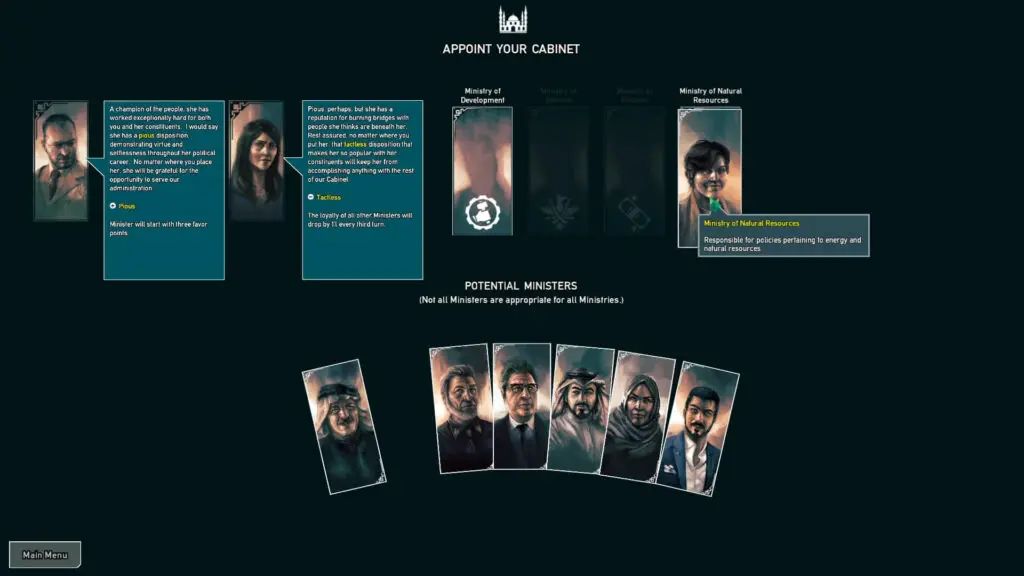
Rogue State Revolution claims to be a rogue-like political simulator that pitches you into the above “challenging scenario” and sees how long you can last before either rebels, a foreign power, or some other calamity forces you from power and you have to start over. The more you play Rogue State, the more advantages you get, such as unlocking new members of the cabinet. The game also begins with a wide array of sliders and dials to play with in order to set the challenge you want. The harder the challenge, the more points towards the next unlock you get.
In terms of gameplay, Rogue State is a turn-based political simulator where you are the President and must look after the procedurally generated middle-eastern nation of Basenji. That’s right, each time you start a new game, the provinces are scrambled and will reappear in different places with different wants and political desires. Certain things stay the same, such as the number of provinces and neighbors but who those neighbors are will change.
You have a limited number of actions each turn to give commands, such as building buildings, moving military units or civilian units, such as the fantastically useful surveyor, or conducting diplomacy. In the early game, you’ll always have enough actions for everything you want to do but as things get trickier and messier, you’ll frequently not have enough actions to do everything that you want to do.
The game offers a deep array of options and sliders to deal with, ranging from the economy to education, healthcare, and the environment. The game also has citizens who appear in cities and villages and you can click on them to see what they think of your current policies. Liberals will like something whilst conservatives will hate it. The other major axis is the religious and secular one and you’ll struggle to please all four.
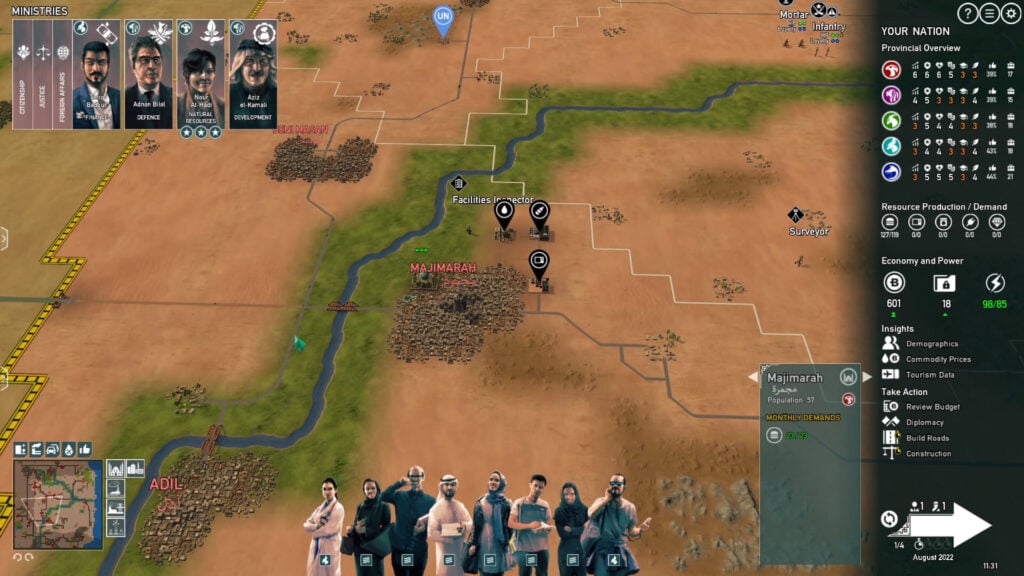
Some buildings will improve the sliders in a specific province, whilst you can also provide a global boost, usually for an ongoing cost, by enacting a policy through your ministers. Your ministers will also have demands for favours to be done, usually in their home province, which if you can achieve they’ll owe you favour and increase their loyalty. Ministers with low loyalty will do less work and even plot against you.
Problems stack up fast in the game too, as your citizens demands increase as the game goes on. As you attempt to stabilize your nation, they’ll demand processed food, manufactured goods, and even luxuries and you’ll need to develop a solid infrastructure of resource gathering and production. If you don’t have access to a particular resource, you can trade for it from a neighbor or even just buy it from the commodity market.
Basenji tends to have oil as its primary export and this is how you’ll make money, as well as manufacture things like plastics which can, in turn, be used to manufacture some of the more complex goods in the game.
The game asks you to keep track of a lot of things, ranging from your money, your intelligence budget, and the happiness of your citizens. There are multiple “Paradox” style lenses to view things such as happiness, environment, and even traffic issues and you’ll quickly realize that balancing things in Basenji is an ongoing problem.
Military matters very much depend on your procedurally generated game, plus your difficulty setting. But you can expect to see the rebel BLF crop up and attack using militants. You can build a strong army but they require money to maintain and in the early game it is a major challenge to stabilize Basenji’s post-war economy.
In terms of warfare, things are fairly simple. Units move and then attack and there’s small array of unit types, along with promotions and upgrades as well as researchable things that you can add to your arsenal beyond the usual prosaic armour and infantry.
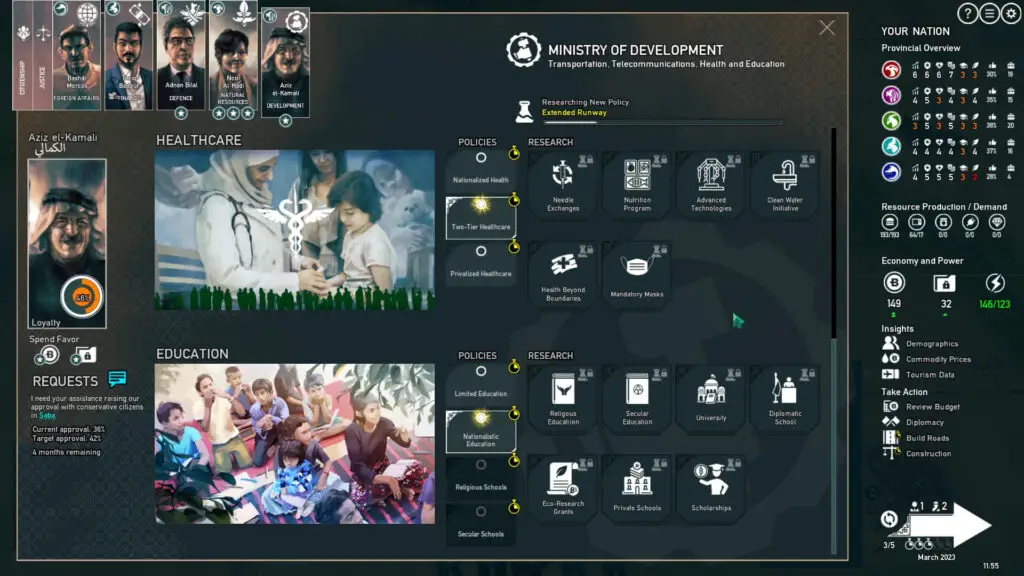
It’s worth stating that whilst Rogue State is a political simulator, it is presented in a fairly tongue-in-cheek way which may not sit well with everyone. The FMV cut scenes and news clips are often funny and provide colour but some of the storylines can be downright bizarre, ranging from walking tanks to a whole country that is run by a chicken. You can turn some of these elements off in the initial menu but they can be quite immersion-breaking if you came to the game for a serious political sim.
Rogue State has a lot of positives, ranging from its solid UI, above-average graphics, and interesting premise but they are somewhat overshadowed by a number of problems. First of all, is the huge initial difficulty spike. Rogue State, on its vanilla settings, is a brutally hard game and you’ll likely struggle to get far as its stands. This is partially intentional but can be a bit off-putting. Equally, there are some UI elements that are far too small and hard to read at the moment.
There’s also a major disconnect between the serious tone of the game with its complex chain of supply and the wacky sense of humour at times. This is more of a matter of taste though as the biggest issue, rather than an outright problem, is the “rogue-like” nature of the game. A campaign of Rogue State takes a few hours as a minimum, if not more if you’re doing well. Therefore, if you “die” and start again, it’s a very different experience to, say, Into the Breach where a complete campaign can be done in forty-five minutes.
It’s much harder to press the reset button after hours of play than it is after three-quarters of an hour and you may well find that you prefer to play in spite of the rogue-like element. One plus point though is that you can play with the sliders at the start and hugely alter your game experience to allow you to experiment with things.
Also knowing it’s rogue-like means that you can try a run-through as a totalitarian conservative just to see what your options are and then use the gathered knowledge in the next game. This is a novel idea but at the moment it doesn’t quite mesh with the length of a campaign.
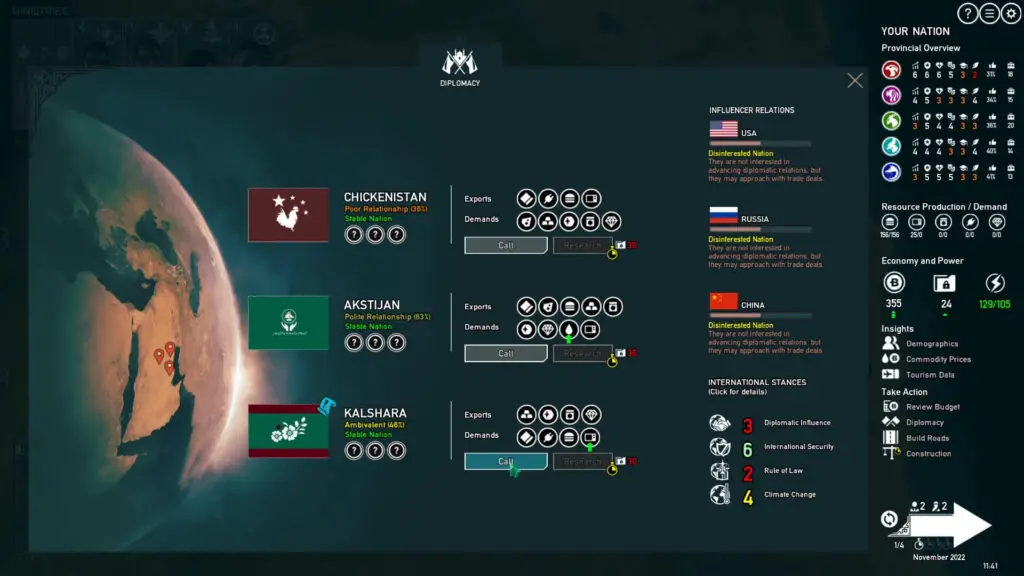
Another minor quibble is that sometimes in the early game you’ll find you have more actions than you know what to do with and often find yourself clicking end turn, even with an action left over. Equally, the procedural nature of the map means sometimes you’ll spawn a map where none of your neighbors want oil, or perhaps all three are hostile and this can lead to a doomed campaign.
As a positive, Rogue State is already hugely improved from the pre-release version and the demo and developers LRDGames, are very keen to keep the game improving and have a roadmap that includes the next three big improvements to the game. All in all, Rogue State is an interesting game that is tricky to recommend. To some, it’ll be catnip but this may be a niche of people that like political sims, rogue-likes, and have a quirky sense of humour. I worry that as it stands Rogue State may put a fair few people off from giving it a go but I think in time, Modern Wolf will iron out the creases and kinks and there could be a hidden gem in the desert here!

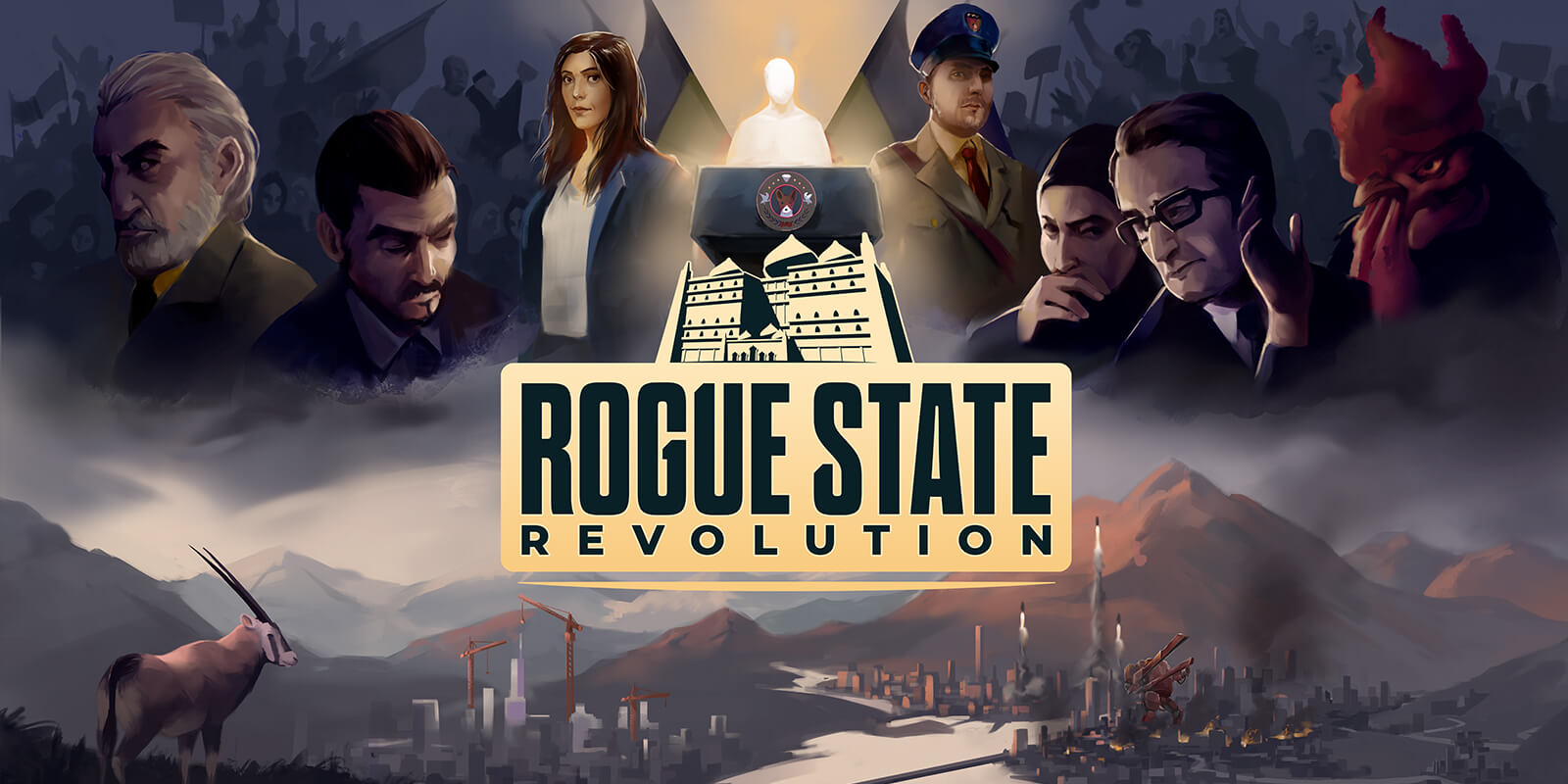






The game is competent and somewhat easy to learn but I just dont find it fun. I think a big part of that is its difficulty. A game being hard doesnt mean its bad but the issue is that there is a lot of random events that blindside any strategy you may have. There is also a lack of control in policies to make you really feel like you are in control of a failed state. Theres not that much in terms of a tech tree and most have some kind of negative consequence anyway.